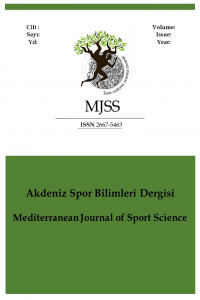Beden Eğitimi ve Spor Öğretmenlerinin Teknopedagojik Eğitim Yeterlikleri İle Öz Yeterlikleri Arasındaki İlişki
Beden Eğitimi ve Spor Öğretmeni, Teknopegagojik Yeterlik, Öz Yeterlik
The Relationship Between The Technopedagogical Competences and Self Efficacy of Physical Education and Sports Teachers
___
- Abbitt, J. T. (2011). An Investigation of the relationship between self efficacy beliefs about technology integration and technological pedagogical content knowledge (TPACK) among preservice teachers. Journal of Digital Learning in Teacher Education, 27(4), 134-143. https://doi.org/10.1080/21532974.2011.10784670.
- Albayrak Sarı, A., Canbazoğlu Bilici, S., Baran, E. & Özbay, U. (2016). Investigating the relationship between teachers’ technological pedagogical content knowledge (TPACK) competencies and attitudes towards information and communication technologies. Eğitim Teknolojisi Kuram ve Uygulama, 6(1), 1-21. https://doi.org/10.17943/etku.11643.
- Bakaç, E. & Özen, R. (2017). Examining preservice teachers’ material design self-efficacy beliefs based on their technological pedagogical content knowledge competencies. Ahi Evran Üniversitesi Kırşehir Eğitim Fakültesi Dergisi (KEFAD), 18(2), 613632. Retrieved from https://dergipark.org.tr/tr/pub/kefad/issue/59416/853301.
- Bandura, A. (1977). Self-Efficacy: Toward a unifying theory of behavioural change. Psychological Review, 84, 191-215. https://doi.org/10.1037/0033-295X.84.2.191.
- Cengiz, C. (2015) The development of TPACK, technology integrated self-efficacy and instructional technology outcome expectations of pre-service physical education teachers. Asia-Pacific Journal of Teacher Education, 43(5), 411- 422. https://doi.org/10.1080/1359866X.2014.932332.
- Chai, C. S., Koh, J. H. L., Tsai, C. C. & Tan, L. L.W. (2011). Modeling primary school pre-service teachers’ Technological Pedagogical Content Knowledge (TPACK) for meaningful learning with information and communication technology (ICT). Computers&Education, 57(1), 1184-1193. https://doi.org/10.1016/j.compedu.2011.01.007.
- Çapa, Y., Çakıroğlu, J., & Sarıkaya, H. (2005). The development and validation of a Turkish version of teachers’ sense of efficacy scale. Education and Science, 30(137), 74-81.
- Çam, E. & Saltan, F. (2019). The relationship between primary education teachers’ technological pedagogical content knowledge and lifelong learning tendency. Elementary Education Online, 18(3), 1195-1207. https://doi.org/10.17051/ilkonline.2019.611468
- Çokluk, Ö., Şekercioğlu, G., & Büyüköztürk, Ş. (2010). Çok değişkenli istatistik SPSS ve LISREL uygulamaları (Birinci baskı). Ankara: Pegem Akademi.
- Ertürk, S (1988). Türkiye'de eğitim felsefesi sorunu. Hacettepe Üniversitesi Eğitim Fakültesi Dergisi, 3, 11-16. Retrieved from https://dergipark.org.tr/tr/pub/hunefd/issue/7834/103113.
- İlkay, N. (2017). Self-efficacy of perspective pre-school teachers' in content of technological pedagogical content knowledge (Sakarya University sample). Master's Thesis. Sakarya University, Institute of Educational Sciences, Sakarya.
- Kabakçı Yurdakul, I., Odabaşı, H. F., Kılıçer, K, Çoklar, A. N., Birinci, G. & Kurt, A. A. (2012). The development, validity and reliability of TPACK-deep: A technological pedagogical content knowledge scale. Computers & Education, 58(3), 964-977. https://doi.org/10.1016/j.compedu.2011.10.012.
- Karalar, H. & Aslan Altan, B. (2016). Examining pre-service primary education teachers’ TPACK competencies and teacher selfefficacies. Cumhuriyet International Journal of Education-CIJE, 5(5), 15-30. https://doi.org/10.30703/cije.321422
- Keser, H., Karaoğlan Yılmaz, F. G. & Yılmaz, R. (2015). TPACK Competencies and technology integration self- efficacy perceptions of pre-service teachers. Elementary Education Online, 14(4), 1193-1207. https://doi.org/10.17051/io.2015.65067
- Karasar, N. (2005). Bilimsel araştırma yöntemi (17. Baskı). Ankara: Nobel Yayın Dağıtım.
- Koehler, M. J. & Mishra, P. (2005). Teachers learning technology by design. Journal of Computing in Teacher Education, 21(3), 94–102. doi: 10.1.1.130.7937
- Koehler, M. J. & Mishra, P. (2009). What is technological pedagogical content knowledge?. Contemporary Issues in Technology and Teacher Education, 9(1), 60-70. Retrieved from http://www.citejournal.org/vol9/iss1/general/article1.cfm.
- Mishne, J. (2012). An investigation of the relationships between technology use and teachers’ selfefficacy, knowledge and experience. (Doctoral Dissertation, Pepperdine University). Retrieved from ProQuest Dissertations and Theses. (UMI No. 3503821)
- Sağlam Kaya, Y. (2019). Investigation of preservice teachers’ technopedagogical teaching competencies and teacher’s self-efficacy in terms of various variables. Journal of Theoretical Educational Science, 12(1), 185-204. https://doi.org/10.30831/akukeg.420909.
- Seymen, A. F. (2017). Associating the characteristics of Y and Z generation traits with ministry of national education 2014-2019 strategic program and TUBITAK vision 2023 predictions. Kent Akademisi Kent Kültürü ve Yönetimi Hakemli Elektronik Dergisi, 10(32), 467-489.
- Shulman, L. S. (1986). Those who understand: Knowledge growth in teaching. Educational Researcher, 15(2), 4–14. doi: 10.3102/0013189X015002004
- Tschannen-Moran, M., & Hoy, A. W. (2001). Teacher efficacy: capturing an elusive construct. Teaching and Teacher Education, 17(7), 783-805. https://doi.org/10.1016/S0742-051X(01)00036-1.
- Turgut, T. (2017). Technological pedagogical content knowledge qualification social studies teachers Karabük province case. (Master's Thesis.). Karabük University, Social Sciences Institute, Karabük.
- Ünal, E. & Teker, N. (2018). The Adaption of Technology Integration Self-Efficacy Scale into Turkish. Anemon Muş Alparslan Üniversitesi Sosyal Bilimler Dergisi, 6(6), 973-978. https://doi.org/10.18506/anemon.400497
- Yıldız, H. (2017). Analysis of development of technological pedagogical content knowledge on geometry of mathematics teachers.(Doctoral dissertation). Karadeniz Teknik University, Institute of Educational Sciences, Trabzon.
- Yayın Aralığı: Yılda 4 Sayı
- Başlangıç: 2018
- Yayıncı: Hasan ŞAHAN
İnci SEÇKİN AĞIRBAŞ, Emre BELLİ
Mehmet KUMARTAŞLI, Süleyman YILDIRIM, Abdullah Yavuz AKINCI
Türk Futbolunda Seyircilerin Video Yardımcı Hakem (VAR) Uygulamasına Bakış Açılarının İncelenmesi.
Özlem EKİZOĞLU, Mahmut Sami AKYÜZ
Takım Sporcularında Üst Ekstremite Propriosepsiyonlarının Karşılaştırılması
Nilgün VURGUN, Şebnem ŞARVAN CENGİZ, Hayal ÖRCÜTAŞ
Spor Bilimlerinde Öğrenim Gören Öğrencilerin Liderlik Yönelimlerinin İncelenmesi
Samet ZENGİN, Mustafa Barış SOMOĞLU
15-17 Yaş Grubu Futbolcularda Q Açısının Anaerobik Zirve Güce ve Dengeye Etkisi
Nilgün VURGUN, Şebnem ŞARVAN CENGİZ, Hüseyin KARESİ, Hayal ÖRCÜTAŞ
Tenis Sporu ve Duygular: PRISMA Bildirimi Kriterlerini Kullanan Sistematik Bir İnceleme
Beden Eğitimi Öğretmenlerinin Psikolojik Performans Düzeylerinin İncelenmesi
Muhammet MAVİBAŞ, Buğra Çağatay SAVAŞ, Yunus Emre ÇİNGÖZ, Murat TURAN
